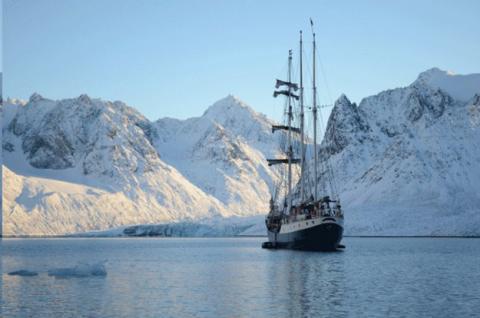Hell is a Cold Place in Ian McGuire’s ‘North Water’

The North Water
Ian McGuire
Holt
272 pages
In 1859, the whaling ship Volunteer sets off from England on a journey to the Arctic Circle. Aboard the Volunteer is Patrick Sumner, an Irish-born surgeon dishonorably discharged from the British Army for crimes committed during the Siege of Delhi, and a harpooner named Henry Drax, introduced in the opening pages of The North Water as a murderer and sexual deviant of the first order.
Things go downhill from there:
“They sail north from Lerwick through long days of fog and sleet and bitter wind, days without ease or letup, when the sea and sky meld together into a damp weft of roiling and impermeable grayness. Sumner stays in his cabin puking incessantly, unable to read or write, wondering what he has done to himself. Twice they are hit by gales from the east. The cables screech, and the ship slumps and pitches amidst the seething hillocks of an adamantine sea.”
Inevitably, The North Water carries echoes of Melville and Lord Jim, but the sensibility behind Ian McGuire’s engrossing new novel is unmistakably Cormac McCarthy. With its exquisitely detailed acts of violence – each more graphic and disturbing than the next – the author depicts a hellish world that, like much of McCarthy’s work, is both unsparing and utterly convincing.
As protagonists go, Patrick Sumner is often frustrating to root for. Irreparably compromised by events in India, now spiritually adrift and addicted to laudanum, he’s slow to recognize the threats facing the crew of the Volunteer—not just from the killer Drax, but from an insurance scheme to scuttle the whaler in the North Water. On the other hand, Sumner demonstrates an impressive ability to survive under unimaginable conditions, including near-death by freezing on more than one occasion, and his journey ends in a more or less uplifting manner.
As for Drax, the author convincingly inhabits his sociopathic perspective. Without a moment’s hesitation, Drax lies to implicate the ship’s carpenter in the despicable murder of a cabin boy:
“Words are just noises in a certain order, and he can use them any way he wishes. Pigs grunt, ducks quack, and men tell lies: that is how it generally goes.”

Secondary characters are vividly rendered as well, including Captain Brownlee, complicit in the insurance scheme yet grudgingly professional in his nautical duties, and First Mate Cavendish, an expert in the art of whaling but long since bereft of any moral compass.
Passages about whaling, the slaughter of seals and related activities are intensely depicted and not for readers who are faint of heart. But McGuire’s command of details feels completely appropriate, as does the novel’s ceaselessly grim mise en scène.
From the opening pages, where Henry Drax wreaks his unique brand of mayhem on the docks of Hull, McGuire ratchets up the suspense until its breaking point during a scene in the Captain’s claustrophobic quarters, when Drax’s crimes become known. Tensions dip after that, as the novel becomes more of a tale of survival in the Far North and Drax fades into the background.
But throughout, the author excels at depicting this alien world of desperation and endurance:
“That night the wind veers from north to west, and a violent storm blows up. One of the makeshift tents is ripped from its moorings, the framework of spars and booms that holds it up collapses, and the men inside, exposed suddenly to frigid blasts of wind and snow, are forced to chase the loose and cartwheeling canvas out across the ice. Eventually, when it snags on a hummock, they wrestle it down and drag it, writhing and flapping, back to the camp … The noise outside is enormous. The ice is moving again, and Sumner can hear, below the shrill descant of the wind and the rattling and straining of the canvas, an occasional dull and vast concussion as the pack roves and breaches.”
In The North Water, nature isn’t just red in tooth and claw, it’s cruel and sociopathic in its own way, and free of anthropomorphic remorse or conscience.
Author Bio:
Lee Polevoi, Highbrow Magazine’s chief book critic, is completing a new novel.
For Highbrow Magazine





























































































































































































































































































































